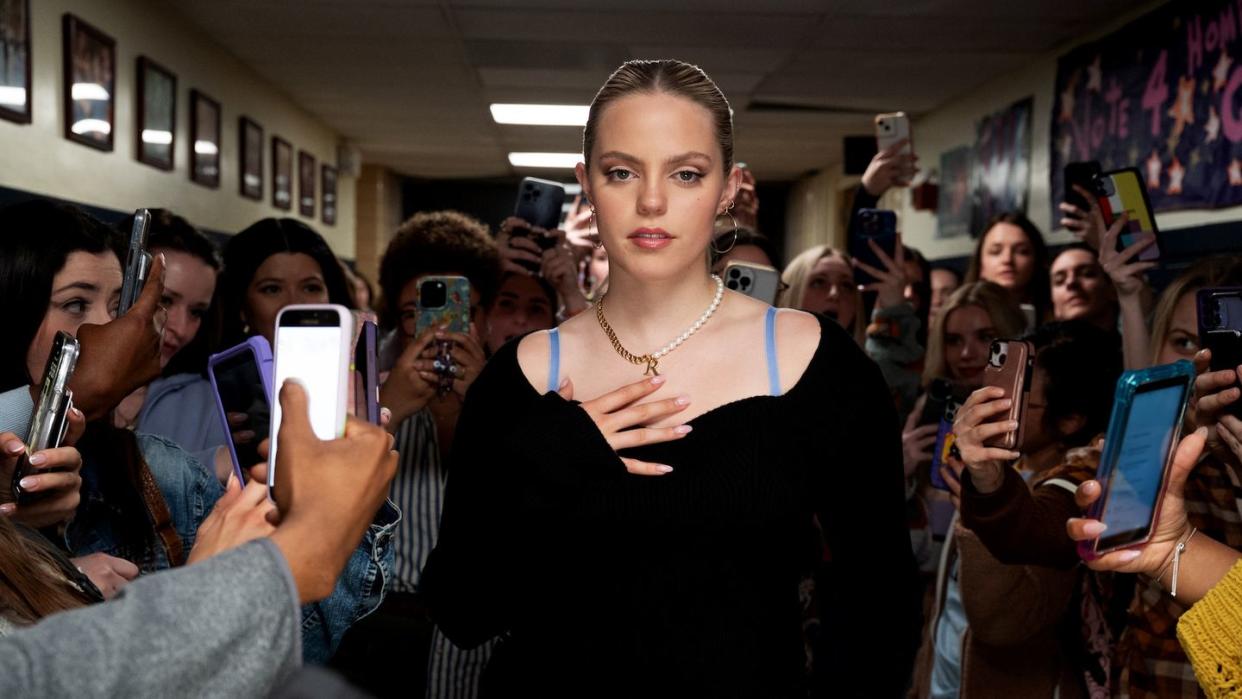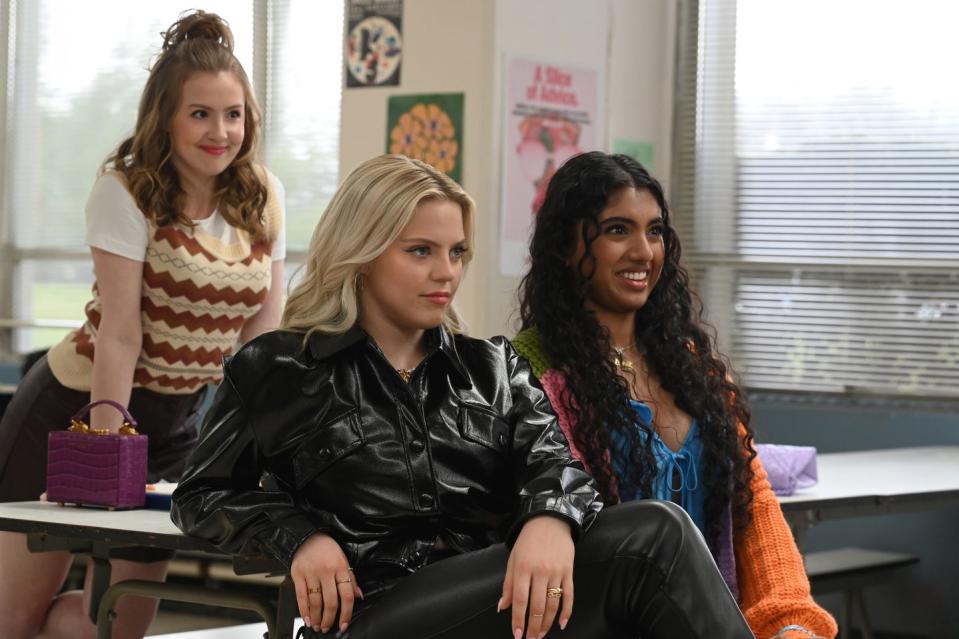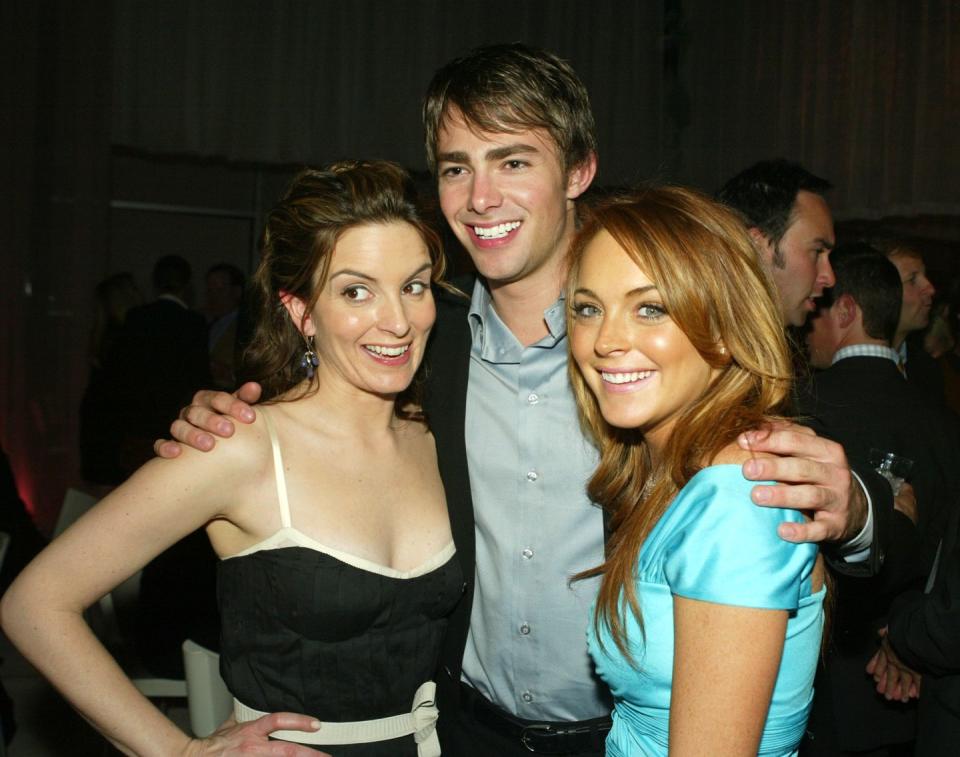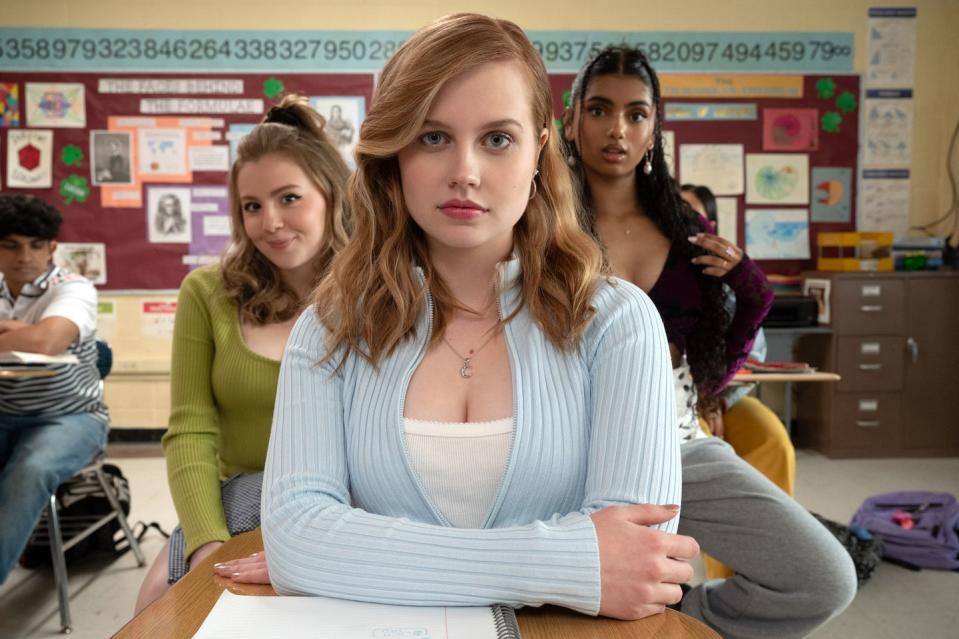You Can't Dilute the Core Message of "Mean Girls"

- Oops!Something went wrong.Please try again later.
"Hearst Magazines and Yahoo may earn commission or revenue on some items through these links."
In 2009, I was an acne-prone and Abercrombie-pilled sixteen-year-old. I traveled to New Paltz—a small leafy town an hour or two drive outside New York City—to take part in a school exchange. I was very far (3,211 miles!) away from my home in the U.K., but my surroundings felt weirdly familiar: The school hallways and lockers, the cafeteria and its real-life safari of jocks, nerds, theater kids, cheerleaders, and every stereotype in-between. Most of all, I recognized the brutality of high school. (The corridors smelt of competition and fear—a specifically American combination.) When the trip ended with a homecoming dance, it felt like the final scene of my very own teen movie.
The 2000s were the golden era of the high school movie. In my tweens, I spent many nights studying (and idolizing) the American teen experience at sleepovers, watching films like Bring it On, John Tucker Must Die, She’s the Man, and High School Musical. In this canon, there is no more foundational text than Mean Girls, Tina Fey’s 2004 teen flick that became a cultural phenomenon—one that is still quoted by a generation of millennials. (By the time I went on school exchange, I could recite the script by heart.)
Now, Fey has returned with a musical remake of her seminal work. Mean Girls 2.0 follows the same plot as the original with a very similar script, while introducing new actors (Angourie Rice, Bebe Wood) and musical numbers from the successful Broadway show. The film is an entertaining spectacle (if musicals are your thing) and features a surprise cameo appearance from Lindsay Lohan. But the strength of the original Mean Girls was rooted in the specific moment that it captured—one where the high school experience was defined, as the title suggests, by meanness. Somewhere in the process of adding singing, dancing, and bringing the story to the present day, the message of Mean Girls has been diluted.

In 2004, when Cady Heron (Lohan) arrived at North Shore High School after years of being home-schooled in Africa, she became the vehicle for exploring the archetypal American high school through fresh eyes. As she infiltrated the plastics, with the aim of sabotaging queen bee Regina George, she took us through “girl world”—a place where “all the fighting had to be sneaky,” and where Halloween was the sluttiest day of the year. Gradually, Cady learned how to play the game, complete with 2000s pleated skirts, big hair, and shiny lip gloss. “Being in the plastics was like being famous,” she said, as she harnessed the power of her newfound popularity—before it all came crashing down.
In a culture where viewers are suffering from major reboot and remake fatigue, the new Mean Girls faces an uphill battle. The first version was so beloved and, well, a lot of people hate musicals. Some will inevitably accuse the film, which has a notably more diverse cast—including Jaquel Spivey and Auliʻi Cravalho—of “going woke,” or whatever phrasing they prefer. Others will take the opportunity to declare it the “worst film ever!” for an easy dunk. (Personally, I went into it ready to declare that Walmart’s Black Friday advert featuring most of the original cast, or Ariana Grande’s “thank u, next” music video, were much better. Meow!) But honestly? Mean Girls (Glee Cast Version) is generally a fun and feel-good watch. Most notably, the film features a star-making performance from Reneé Rapp, whose take on notorious villain Regina George (who she also previously played on Broadway) is the only portrayal that comes close to rivaling the original.
The film does have issues, though. 2024’s Mean Girls is in an awkward spot, where it is trapped between the past and present. The first film’s success was grounded in capturing teen life at a particular time: 2004, in those last few years just before social media took over our lives. The new film is updated to reflect how teens communicate today, mostly on smartphones. But this feels slightly jarring with a script that was mostly written twenty years ago and, with the exception of a few iPhones, doesn’t characterize teen life today with the same level of depth.

There have been noticeable changes, though—for better and worse. 2024’s Mean Girls is based on the successful stage musical, which might be why the new film feels much more “family friendly.” Some of the more risqué jokes, like the affair between Coach Carr and Trang Pak, have been removed. (Probably for the best, right?) In other places, the language is toned down. When a rage-filled Regina George writes next to her own picture in the famous Burn Book, she now calls herself a “fugly cow,” not a “fugly slut.”
For me, this became a problem when these updates started to diminish the film’s core message. For instance, I was appalled by the absence of Miss Norbury’s gym hall rallying cry: “You all have got to stop calling each other sluts and whores. It only makes it okay for guys to call you sluts and whores!” This time, the emphasis shifted to a much cornier, Hallmark-esque proverb: “Calling someone stupid doesn’t make you smart.” While this line was a part of the original 2004 script, it's shift as a core message in the new iteration feels more like a lesson you'd teach an eight-year-old, not a teenager.
Fey’s “sluts and whores” comment wasn’t just a zingy line. The misogyny of high school was the main villain in the original Mean Girls. The film made astute observations about slut-shaming, navigating “girl world,” popularity vs. notoriety, and how women are continually pitted against each other. It was a call-to-action for young women to reject those dynamics and, instead, try to be allies. That was a fairly radical statement to slip into a teen movie which millions of young people would put on at sleepovers, or re-watch for years to come.
2024’s Mean Girls does keep a lot of the quotable moments: “You can’t sit with us!”, “It’s October 3rd,” “Stop trying to make fetch happen!” and many more are all there. But as much as fans love these lines, it was the social commentary—often told through shadier, smarter, and meaner jokes—that made Mean Girls a phenomenon. The original film was a steady drip-feed of brutality: Girls who looked like Danny Devito. Girls who (just one time!) made out with a hot dog. Girls who were shamed for their weight, their sexuality, or being virgins. Few things were off-limits—and this taught us about the confusing rules and pressures that young women at the time were navigating.
I suppose it makes some sense that the script was toned down this time around. Mean Girls 2.0 is set today, when some of these prejudices are (hopefully!) less common in schools. But I wish the new film had either been set in 2004 and stayed more true to the nastiness of the original, or committed to a bigger rewrite to capture the current moment with the same specificity and smartness that made its predecessor so great. I wonder what counts as “mean girl” behavior today? Teenagers might be more progressive (or are they?) but I’m sure they’ve found new ways to torture each other. Tell me about those.

During my American school exchange, back in 2009, one of my fellow Brits told me she couldn’t believe how nasty the American students were to each other. Or more precisely, how loud they were about it. They’d act super nice then say horrible things as soon as the person left. They’d spread terrible, humiliating rumors about people in other cliques—or sometimes their own—that they knew weren’t even true. One night, her exchange student and some friends drove past a classmate’s home and pelted it with eggs. (In a dispute over—what else?—a boy.) “It’s like being in Mean Girls,” she said one day on the school bus, in a way that suggested the real-life version isn’t nearly as fun. I wonder if, like a naive Cady Heron, she would have been sucked into that behavior if she had become a full-time student there?
The new Mean Girls feels simply...stuck. There is a lot of singing and dancing, but far fewer new observations about what 2024’s crop of teenagers are like—and what they need to hear, or do better. Maybe Fey’s social commentary is that high school hasn’t changed substantially since 2004, except there are a lot more smartphones and it’s a little less mean. But the problem is that making Mean Girls even a little less mean ends up sanitizing its core message—and that is so not fetch.
You Might Also Like

